IBEM: Brazil's Growth, Development & Institutional Challenges
VerifiedAdded on 2023/04/22
|15
|4363
|57
Essay
AI Summary
This essay explores Brazil's economic growth and development through the lens of institutional theory, examining the shift from functional considerations to external influences. It evaluates Brazil's competitive position using Porter's Diamond model, analyzing factors such as demand conditions, factor endowments, related industries, and firm strategy. The essay highlights the disparities in income, corruption, drug abuse, and education gaps that hinder Brazil's progress. It also discusses Brazil's recovery from the 2008 recession, its major exports, and the significance of sectors like automobile, leisure, services, and agriculture. The analysis further emphasizes Brazil's active participation in international organizations and the importance of the Port of Santos. Finally, the essay outlines the challenges of doing business in Brazil from an institutional perspective, considering factors that affect international trade and investment. Desklib provides a platform for students to access this and other solved assignments for academic assistance.
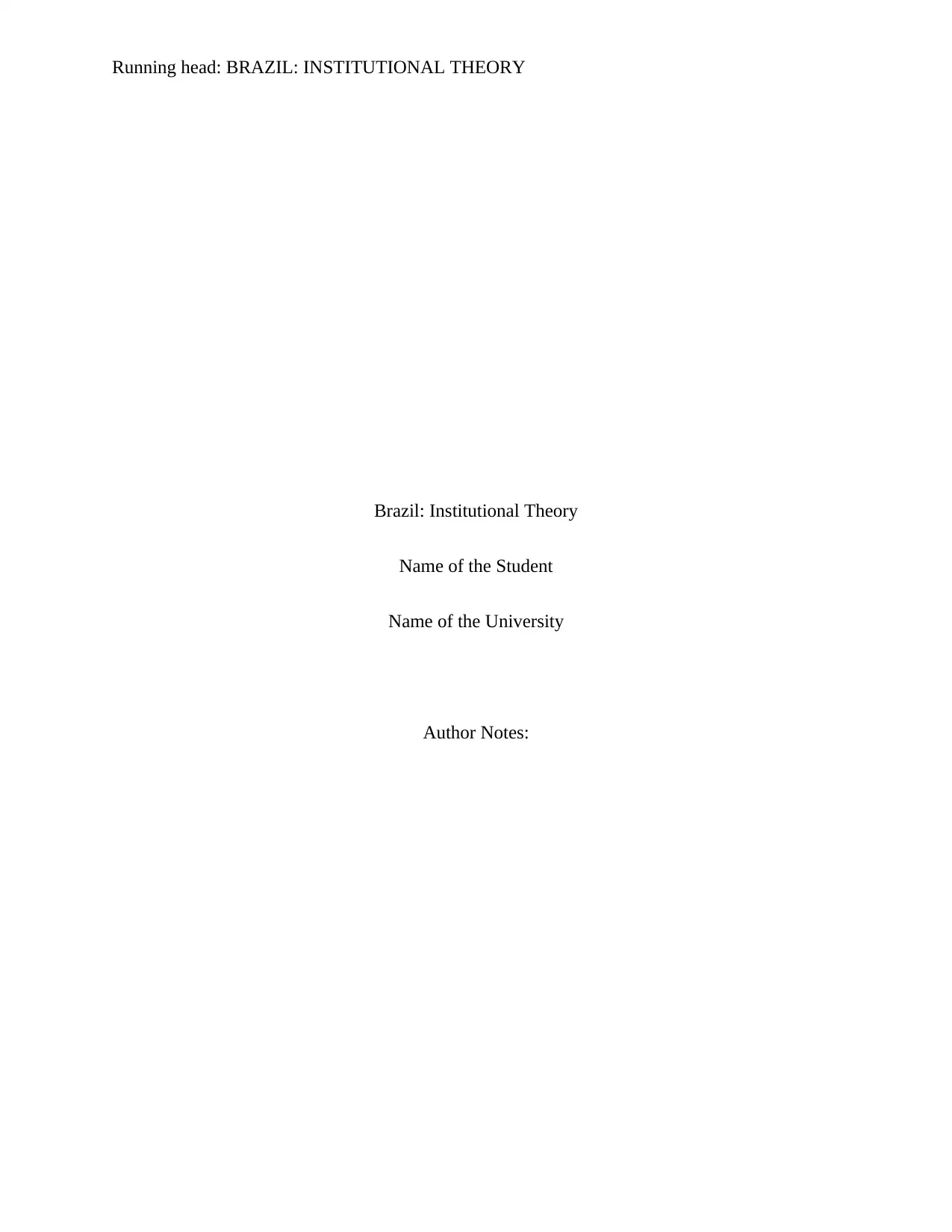
Running head: BRAZIL: INSTITUTIONAL THEORY
Brazil: Institutional Theory
Name of the Student
Name of the University
Author Notes:
Brazil: Institutional Theory
Name of the Student
Name of the University
Author Notes:
Paraphrase This Document
Need a fresh take? Get an instant paraphrase of this document with our AI Paraphraser
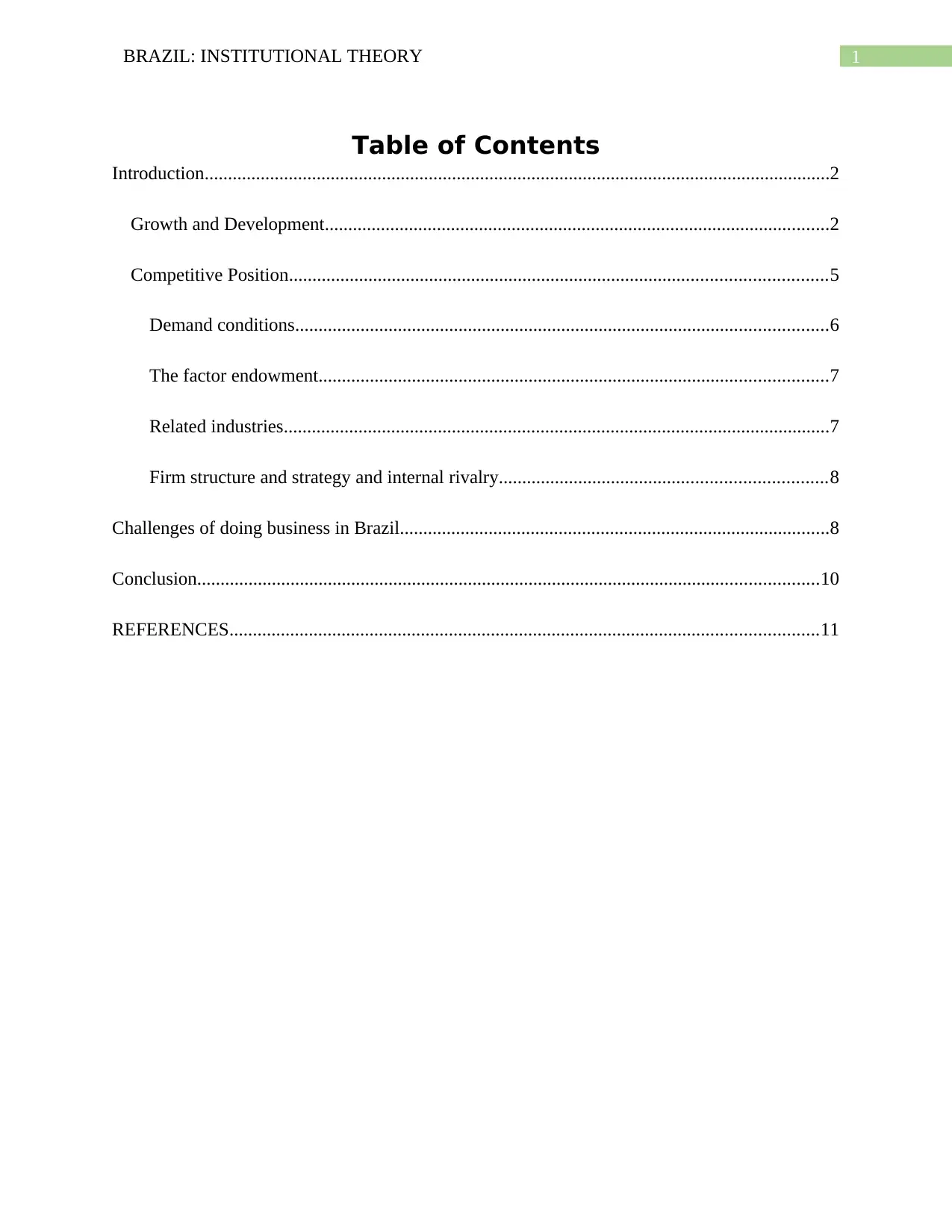
1BRAZIL: INSTITUTIONAL THEORY
Table of Contents
Introduction......................................................................................................................................2
Growth and Development............................................................................................................2
Competitive Position...................................................................................................................5
Demand conditions..................................................................................................................6
The factor endowment.............................................................................................................7
Related industries.....................................................................................................................7
Firm structure and strategy and internal rivalry......................................................................8
Challenges of doing business in Brazil............................................................................................8
Conclusion.....................................................................................................................................10
REFERENCES..............................................................................................................................11
Table of Contents
Introduction......................................................................................................................................2
Growth and Development............................................................................................................2
Competitive Position...................................................................................................................5
Demand conditions..................................................................................................................6
The factor endowment.............................................................................................................7
Related industries.....................................................................................................................7
Firm structure and strategy and internal rivalry......................................................................8
Challenges of doing business in Brazil............................................................................................8
Conclusion.....................................................................................................................................10
REFERENCES..............................................................................................................................11
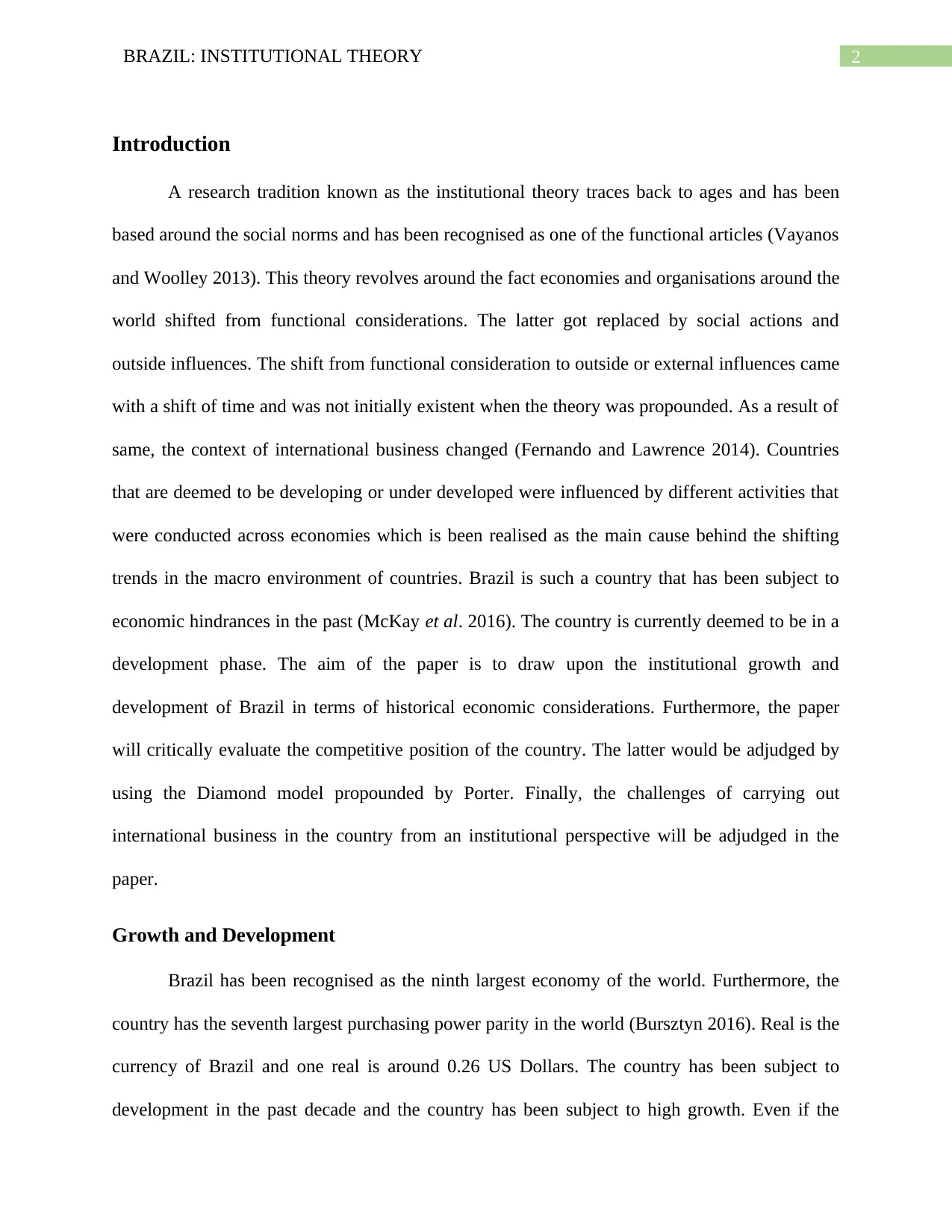
2BRAZIL: INSTITUTIONAL THEORY
Introduction
A research tradition known as the institutional theory traces back to ages and has been
based around the social norms and has been recognised as one of the functional articles (Vayanos
and Woolley 2013). This theory revolves around the fact economies and organisations around the
world shifted from functional considerations. The latter got replaced by social actions and
outside influences. The shift from functional consideration to outside or external influences came
with a shift of time and was not initially existent when the theory was propounded. As a result of
same, the context of international business changed (Fernando and Lawrence 2014). Countries
that are deemed to be developing or under developed were influenced by different activities that
were conducted across economies which is been realised as the main cause behind the shifting
trends in the macro environment of countries. Brazil is such a country that has been subject to
economic hindrances in the past (McKay et al. 2016). The country is currently deemed to be in a
development phase. The aim of the paper is to draw upon the institutional growth and
development of Brazil in terms of historical economic considerations. Furthermore, the paper
will critically evaluate the competitive position of the country. The latter would be adjudged by
using the Diamond model propounded by Porter. Finally, the challenges of carrying out
international business in the country from an institutional perspective will be adjudged in the
paper.
Growth and Development
Brazil has been recognised as the ninth largest economy of the world. Furthermore, the
country has the seventh largest purchasing power parity in the world (Bursztyn 2016). Real is the
currency of Brazil and one real is around 0.26 US Dollars. The country has been subject to
development in the past decade and the country has been subject to high growth. Even if the
Introduction
A research tradition known as the institutional theory traces back to ages and has been
based around the social norms and has been recognised as one of the functional articles (Vayanos
and Woolley 2013). This theory revolves around the fact economies and organisations around the
world shifted from functional considerations. The latter got replaced by social actions and
outside influences. The shift from functional consideration to outside or external influences came
with a shift of time and was not initially existent when the theory was propounded. As a result of
same, the context of international business changed (Fernando and Lawrence 2014). Countries
that are deemed to be developing or under developed were influenced by different activities that
were conducted across economies which is been realised as the main cause behind the shifting
trends in the macro environment of countries. Brazil is such a country that has been subject to
economic hindrances in the past (McKay et al. 2016). The country is currently deemed to be in a
development phase. The aim of the paper is to draw upon the institutional growth and
development of Brazil in terms of historical economic considerations. Furthermore, the paper
will critically evaluate the competitive position of the country. The latter would be adjudged by
using the Diamond model propounded by Porter. Finally, the challenges of carrying out
international business in the country from an institutional perspective will be adjudged in the
paper.
Growth and Development
Brazil has been recognised as the ninth largest economy of the world. Furthermore, the
country has the seventh largest purchasing power parity in the world (Bursztyn 2016). Real is the
currency of Brazil and one real is around 0.26 US Dollars. The country has been subject to
development in the past decade and the country has been subject to high growth. Even if the
⊘ This is a preview!⊘
Do you want full access?
Subscribe today to unlock all pages.

Trusted by 1+ million students worldwide
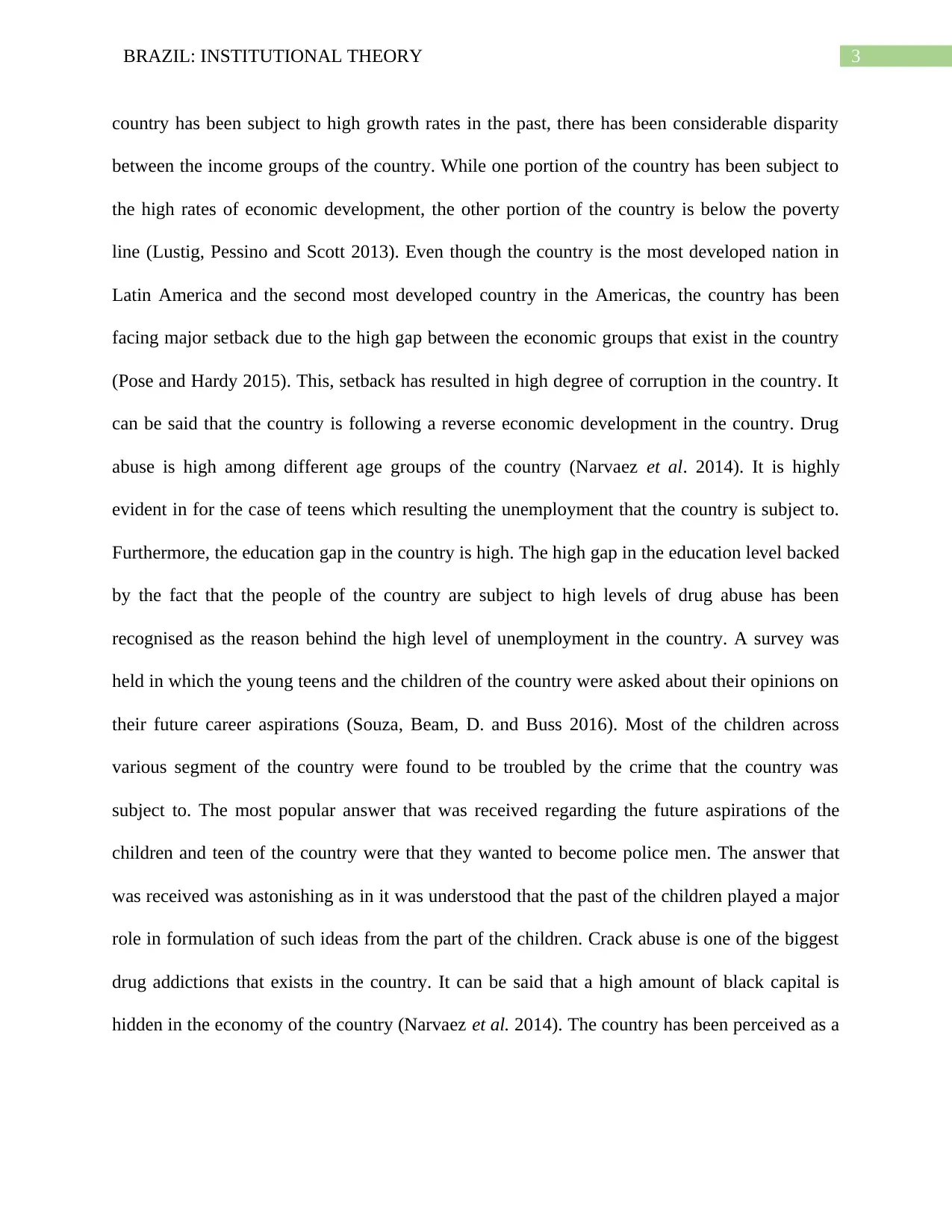
3BRAZIL: INSTITUTIONAL THEORY
country has been subject to high growth rates in the past, there has been considerable disparity
between the income groups of the country. While one portion of the country has been subject to
the high rates of economic development, the other portion of the country is below the poverty
line (Lustig, Pessino and Scott 2013). Even though the country is the most developed nation in
Latin America and the second most developed country in the Americas, the country has been
facing major setback due to the high gap between the economic groups that exist in the country
(Pose and Hardy 2015). This, setback has resulted in high degree of corruption in the country. It
can be said that the country is following a reverse economic development in the country. Drug
abuse is high among different age groups of the country (Narvaez et al. 2014). It is highly
evident in for the case of teens which resulting the unemployment that the country is subject to.
Furthermore, the education gap in the country is high. The high gap in the education level backed
by the fact that the people of the country are subject to high levels of drug abuse has been
recognised as the reason behind the high level of unemployment in the country. A survey was
held in which the young teens and the children of the country were asked about their opinions on
their future career aspirations (Souza, Beam, D. and Buss 2016). Most of the children across
various segment of the country were found to be troubled by the crime that the country was
subject to. The most popular answer that was received regarding the future aspirations of the
children and teen of the country were that they wanted to become police men. The answer that
was received was astonishing as in it was understood that the past of the children played a major
role in formulation of such ideas from the part of the children. Crack abuse is one of the biggest
drug addictions that exists in the country. It can be said that a high amount of black capital is
hidden in the economy of the country (Narvaez et al. 2014). The country has been perceived as a
country has been subject to high growth rates in the past, there has been considerable disparity
between the income groups of the country. While one portion of the country has been subject to
the high rates of economic development, the other portion of the country is below the poverty
line (Lustig, Pessino and Scott 2013). Even though the country is the most developed nation in
Latin America and the second most developed country in the Americas, the country has been
facing major setback due to the high gap between the economic groups that exist in the country
(Pose and Hardy 2015). This, setback has resulted in high degree of corruption in the country. It
can be said that the country is following a reverse economic development in the country. Drug
abuse is high among different age groups of the country (Narvaez et al. 2014). It is highly
evident in for the case of teens which resulting the unemployment that the country is subject to.
Furthermore, the education gap in the country is high. The high gap in the education level backed
by the fact that the people of the country are subject to high levels of drug abuse has been
recognised as the reason behind the high level of unemployment in the country. A survey was
held in which the young teens and the children of the country were asked about their opinions on
their future career aspirations (Souza, Beam, D. and Buss 2016). Most of the children across
various segment of the country were found to be troubled by the crime that the country was
subject to. The most popular answer that was received regarding the future aspirations of the
children and teen of the country were that they wanted to become police men. The answer that
was received was astonishing as in it was understood that the past of the children played a major
role in formulation of such ideas from the part of the children. Crack abuse is one of the biggest
drug addictions that exists in the country. It can be said that a high amount of black capital is
hidden in the economy of the country (Narvaez et al. 2014). The country has been perceived as a
Paraphrase This Document
Need a fresh take? Get an instant paraphrase of this document with our AI Paraphraser
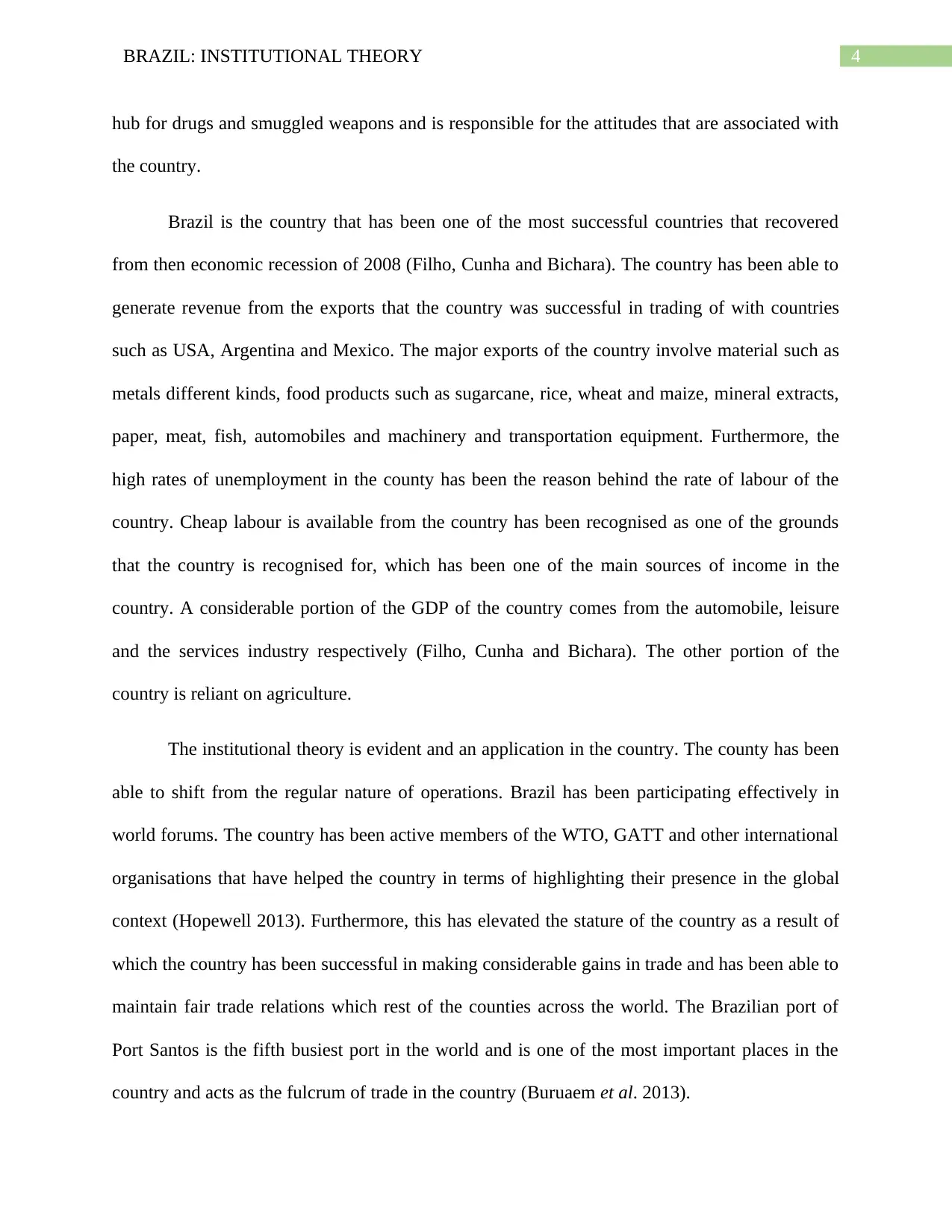
4BRAZIL: INSTITUTIONAL THEORY
hub for drugs and smuggled weapons and is responsible for the attitudes that are associated with
the country.
Brazil is the country that has been one of the most successful countries that recovered
from then economic recession of 2008 (Filho, Cunha and Bichara). The country has been able to
generate revenue from the exports that the country was successful in trading of with countries
such as USA, Argentina and Mexico. The major exports of the country involve material such as
metals different kinds, food products such as sugarcane, rice, wheat and maize, mineral extracts,
paper, meat, fish, automobiles and machinery and transportation equipment. Furthermore, the
high rates of unemployment in the county has been the reason behind the rate of labour of the
country. Cheap labour is available from the country has been recognised as one of the grounds
that the country is recognised for, which has been one of the main sources of income in the
country. A considerable portion of the GDP of the country comes from the automobile, leisure
and the services industry respectively (Filho, Cunha and Bichara). The other portion of the
country is reliant on agriculture.
The institutional theory is evident and an application in the country. The county has been
able to shift from the regular nature of operations. Brazil has been participating effectively in
world forums. The country has been active members of the WTO, GATT and other international
organisations that have helped the country in terms of highlighting their presence in the global
context (Hopewell 2013). Furthermore, this has elevated the stature of the country as a result of
which the country has been successful in making considerable gains in trade and has been able to
maintain fair trade relations which rest of the counties across the world. The Brazilian port of
Port Santos is the fifth busiest port in the world and is one of the most important places in the
country and acts as the fulcrum of trade in the country (Buruaem et al. 2013).
hub for drugs and smuggled weapons and is responsible for the attitudes that are associated with
the country.
Brazil is the country that has been one of the most successful countries that recovered
from then economic recession of 2008 (Filho, Cunha and Bichara). The country has been able to
generate revenue from the exports that the country was successful in trading of with countries
such as USA, Argentina and Mexico. The major exports of the country involve material such as
metals different kinds, food products such as sugarcane, rice, wheat and maize, mineral extracts,
paper, meat, fish, automobiles and machinery and transportation equipment. Furthermore, the
high rates of unemployment in the county has been the reason behind the rate of labour of the
country. Cheap labour is available from the country has been recognised as one of the grounds
that the country is recognised for, which has been one of the main sources of income in the
country. A considerable portion of the GDP of the country comes from the automobile, leisure
and the services industry respectively (Filho, Cunha and Bichara). The other portion of the
country is reliant on agriculture.
The institutional theory is evident and an application in the country. The county has been
able to shift from the regular nature of operations. Brazil has been participating effectively in
world forums. The country has been active members of the WTO, GATT and other international
organisations that have helped the country in terms of highlighting their presence in the global
context (Hopewell 2013). Furthermore, this has elevated the stature of the country as a result of
which the country has been successful in making considerable gains in trade and has been able to
maintain fair trade relations which rest of the counties across the world. The Brazilian port of
Port Santos is the fifth busiest port in the world and is one of the most important places in the
country and acts as the fulcrum of trade in the country (Buruaem et al. 2013).
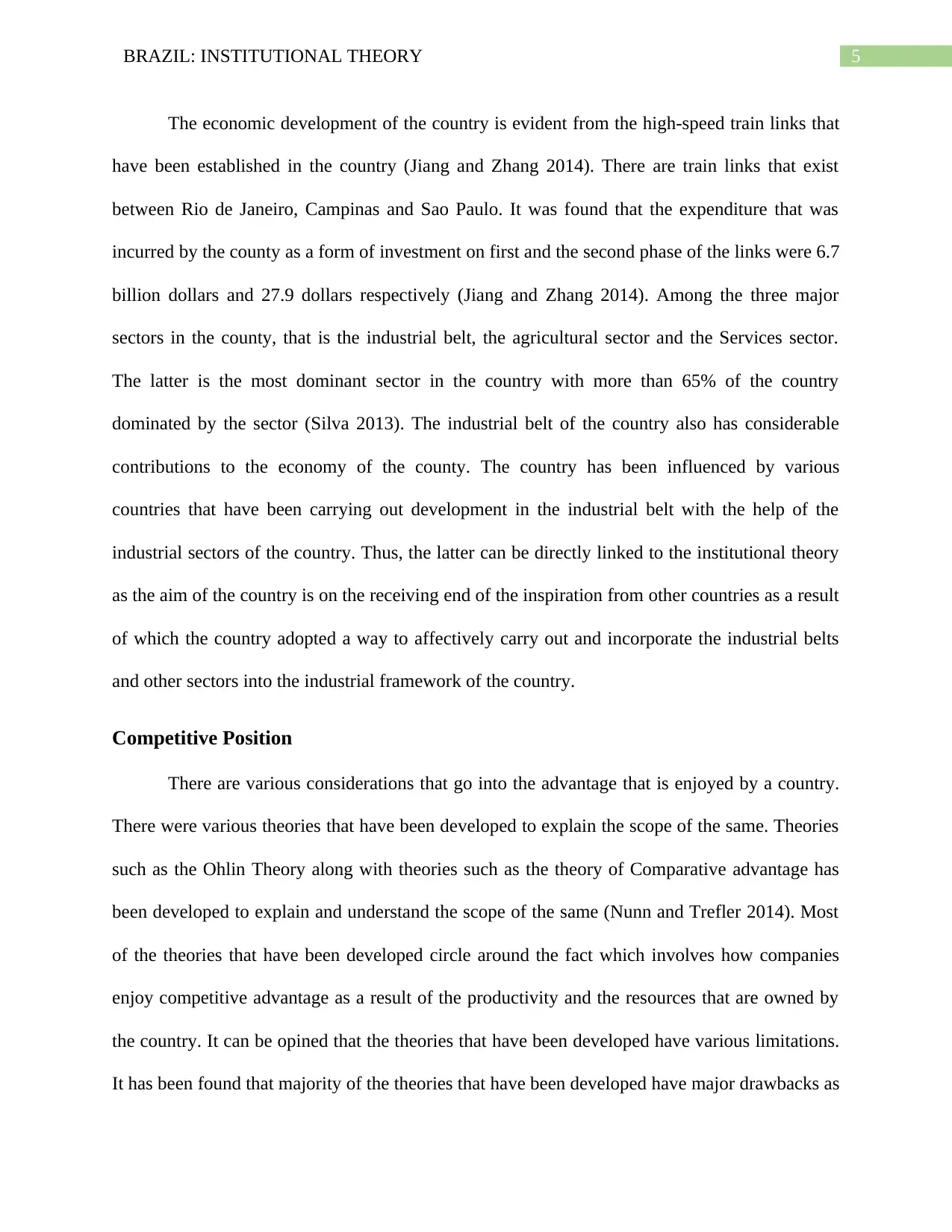
5BRAZIL: INSTITUTIONAL THEORY
The economic development of the country is evident from the high-speed train links that
have been established in the country (Jiang and Zhang 2014). There are train links that exist
between Rio de Janeiro, Campinas and Sao Paulo. It was found that the expenditure that was
incurred by the county as a form of investment on first and the second phase of the links were 6.7
billion dollars and 27.9 dollars respectively (Jiang and Zhang 2014). Among the three major
sectors in the county, that is the industrial belt, the agricultural sector and the Services sector.
The latter is the most dominant sector in the country with more than 65% of the country
dominated by the sector (Silva 2013). The industrial belt of the country also has considerable
contributions to the economy of the county. The country has been influenced by various
countries that have been carrying out development in the industrial belt with the help of the
industrial sectors of the country. Thus, the latter can be directly linked to the institutional theory
as the aim of the country is on the receiving end of the inspiration from other countries as a result
of which the country adopted a way to affectively carry out and incorporate the industrial belts
and other sectors into the industrial framework of the country.
Competitive Position
There are various considerations that go into the advantage that is enjoyed by a country.
There were various theories that have been developed to explain the scope of the same. Theories
such as the Ohlin Theory along with theories such as the theory of Comparative advantage has
been developed to explain and understand the scope of the same (Nunn and Trefler 2014). Most
of the theories that have been developed circle around the fact which involves how companies
enjoy competitive advantage as a result of the productivity and the resources that are owned by
the country. It can be opined that the theories that have been developed have various limitations.
It has been found that majority of the theories that have been developed have major drawbacks as
The economic development of the country is evident from the high-speed train links that
have been established in the country (Jiang and Zhang 2014). There are train links that exist
between Rio de Janeiro, Campinas and Sao Paulo. It was found that the expenditure that was
incurred by the county as a form of investment on first and the second phase of the links were 6.7
billion dollars and 27.9 dollars respectively (Jiang and Zhang 2014). Among the three major
sectors in the county, that is the industrial belt, the agricultural sector and the Services sector.
The latter is the most dominant sector in the country with more than 65% of the country
dominated by the sector (Silva 2013). The industrial belt of the country also has considerable
contributions to the economy of the county. The country has been influenced by various
countries that have been carrying out development in the industrial belt with the help of the
industrial sectors of the country. Thus, the latter can be directly linked to the institutional theory
as the aim of the country is on the receiving end of the inspiration from other countries as a result
of which the country adopted a way to affectively carry out and incorporate the industrial belts
and other sectors into the industrial framework of the country.
Competitive Position
There are various considerations that go into the advantage that is enjoyed by a country.
There were various theories that have been developed to explain the scope of the same. Theories
such as the Ohlin Theory along with theories such as the theory of Comparative advantage has
been developed to explain and understand the scope of the same (Nunn and Trefler 2014). Most
of the theories that have been developed circle around the fact which involves how companies
enjoy competitive advantage as a result of the productivity and the resources that are owned by
the country. It can be opined that the theories that have been developed have various limitations.
It has been found that majority of the theories that have been developed have major drawbacks as
⊘ This is a preview!⊘
Do you want full access?
Subscribe today to unlock all pages.

Trusted by 1+ million students worldwide
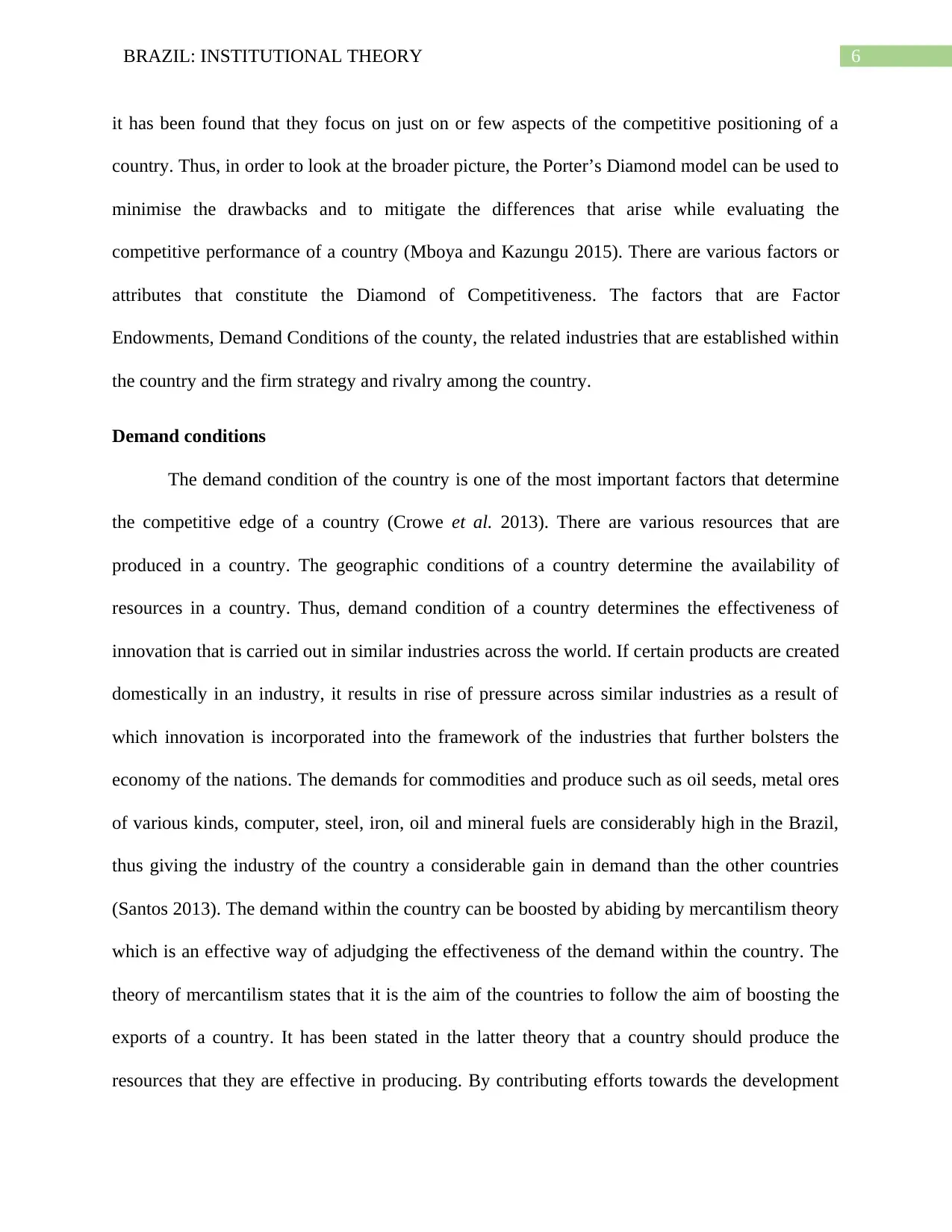
6BRAZIL: INSTITUTIONAL THEORY
it has been found that they focus on just on or few aspects of the competitive positioning of a
country. Thus, in order to look at the broader picture, the Porter’s Diamond model can be used to
minimise the drawbacks and to mitigate the differences that arise while evaluating the
competitive performance of a country (Mboya and Kazungu 2015). There are various factors or
attributes that constitute the Diamond of Competitiveness. The factors that are Factor
Endowments, Demand Conditions of the county, the related industries that are established within
the country and the firm strategy and rivalry among the country.
Demand conditions
The demand condition of the country is one of the most important factors that determine
the competitive edge of a country (Crowe et al. 2013). There are various resources that are
produced in a country. The geographic conditions of a country determine the availability of
resources in a country. Thus, demand condition of a country determines the effectiveness of
innovation that is carried out in similar industries across the world. If certain products are created
domestically in an industry, it results in rise of pressure across similar industries as a result of
which innovation is incorporated into the framework of the industries that further bolsters the
economy of the nations. The demands for commodities and produce such as oil seeds, metal ores
of various kinds, computer, steel, iron, oil and mineral fuels are considerably high in the Brazil,
thus giving the industry of the country a considerable gain in demand than the other countries
(Santos 2013). The demand within the country can be boosted by abiding by mercantilism theory
which is an effective way of adjudging the effectiveness of the demand within the country. The
theory of mercantilism states that it is the aim of the countries to follow the aim of boosting the
exports of a country. It has been stated in the latter theory that a country should produce the
resources that they are effective in producing. By contributing efforts towards the development
it has been found that they focus on just on or few aspects of the competitive positioning of a
country. Thus, in order to look at the broader picture, the Porter’s Diamond model can be used to
minimise the drawbacks and to mitigate the differences that arise while evaluating the
competitive performance of a country (Mboya and Kazungu 2015). There are various factors or
attributes that constitute the Diamond of Competitiveness. The factors that are Factor
Endowments, Demand Conditions of the county, the related industries that are established within
the country and the firm strategy and rivalry among the country.
Demand conditions
The demand condition of the country is one of the most important factors that determine
the competitive edge of a country (Crowe et al. 2013). There are various resources that are
produced in a country. The geographic conditions of a country determine the availability of
resources in a country. Thus, demand condition of a country determines the effectiveness of
innovation that is carried out in similar industries across the world. If certain products are created
domestically in an industry, it results in rise of pressure across similar industries as a result of
which innovation is incorporated into the framework of the industries that further bolsters the
economy of the nations. The demands for commodities and produce such as oil seeds, metal ores
of various kinds, computer, steel, iron, oil and mineral fuels are considerably high in the Brazil,
thus giving the industry of the country a considerable gain in demand than the other countries
(Santos 2013). The demand within the country can be boosted by abiding by mercantilism theory
which is an effective way of adjudging the effectiveness of the demand within the country. The
theory of mercantilism states that it is the aim of the countries to follow the aim of boosting the
exports of a country. It has been stated in the latter theory that a country should produce the
resources that they are effective in producing. By contributing efforts towards the development
Paraphrase This Document
Need a fresh take? Get an instant paraphrase of this document with our AI Paraphraser
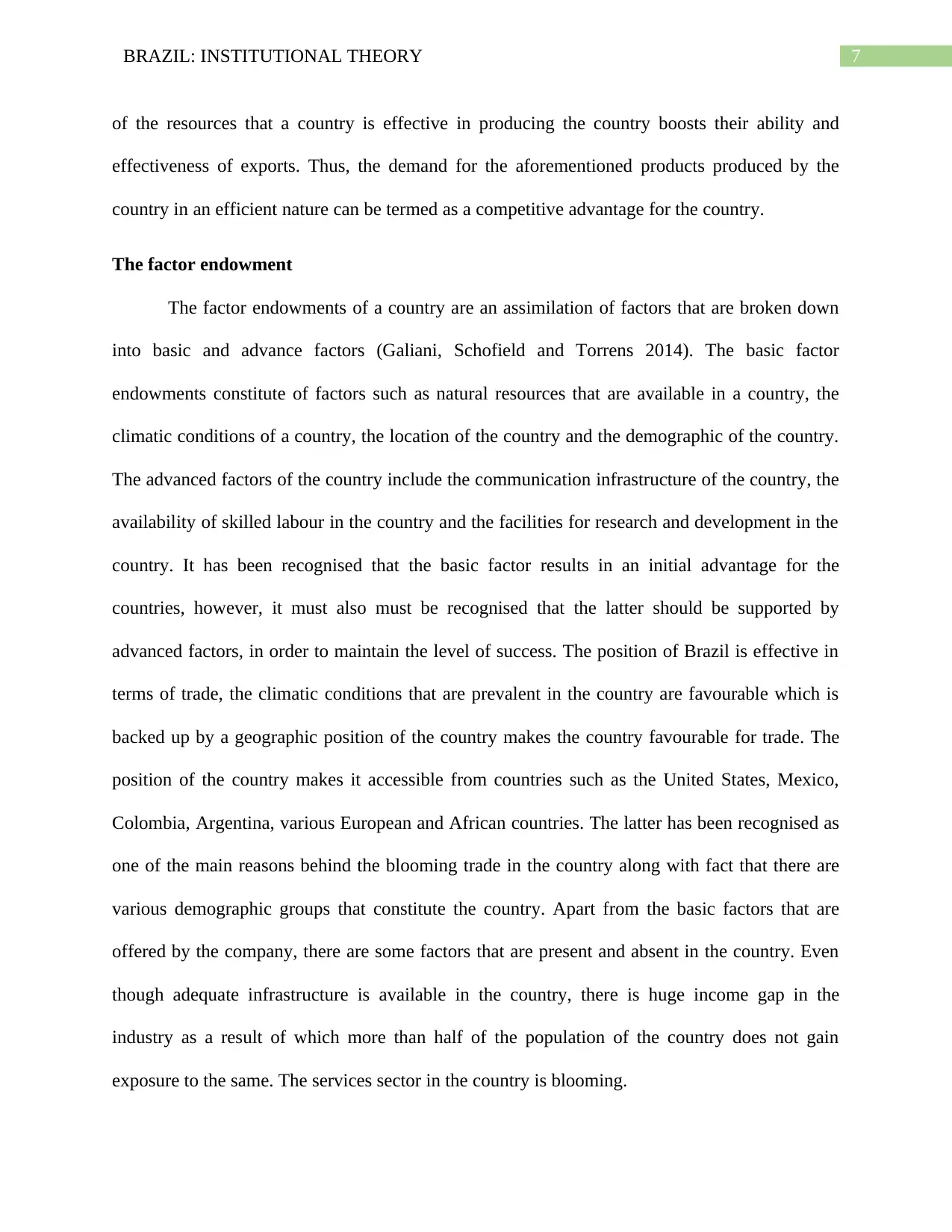
7BRAZIL: INSTITUTIONAL THEORY
of the resources that a country is effective in producing the country boosts their ability and
effectiveness of exports. Thus, the demand for the aforementioned products produced by the
country in an efficient nature can be termed as a competitive advantage for the country.
The factor endowment
The factor endowments of a country are an assimilation of factors that are broken down
into basic and advance factors (Galiani, Schofield and Torrens 2014). The basic factor
endowments constitute of factors such as natural resources that are available in a country, the
climatic conditions of a country, the location of the country and the demographic of the country.
The advanced factors of the country include the communication infrastructure of the country, the
availability of skilled labour in the country and the facilities for research and development in the
country. It has been recognised that the basic factor results in an initial advantage for the
countries, however, it must also must be recognised that the latter should be supported by
advanced factors, in order to maintain the level of success. The position of Brazil is effective in
terms of trade, the climatic conditions that are prevalent in the country are favourable which is
backed up by a geographic position of the country makes the country favourable for trade. The
position of the country makes it accessible from countries such as the United States, Mexico,
Colombia, Argentina, various European and African countries. The latter has been recognised as
one of the main reasons behind the blooming trade in the country along with fact that there are
various demographic groups that constitute the country. Apart from the basic factors that are
offered by the company, there are some factors that are present and absent in the country. Even
though adequate infrastructure is available in the country, there is huge income gap in the
industry as a result of which more than half of the population of the country does not gain
exposure to the same. The services sector in the country is blooming.
of the resources that a country is effective in producing the country boosts their ability and
effectiveness of exports. Thus, the demand for the aforementioned products produced by the
country in an efficient nature can be termed as a competitive advantage for the country.
The factor endowment
The factor endowments of a country are an assimilation of factors that are broken down
into basic and advance factors (Galiani, Schofield and Torrens 2014). The basic factor
endowments constitute of factors such as natural resources that are available in a country, the
climatic conditions of a country, the location of the country and the demographic of the country.
The advanced factors of the country include the communication infrastructure of the country, the
availability of skilled labour in the country and the facilities for research and development in the
country. It has been recognised that the basic factor results in an initial advantage for the
countries, however, it must also must be recognised that the latter should be supported by
advanced factors, in order to maintain the level of success. The position of Brazil is effective in
terms of trade, the climatic conditions that are prevalent in the country are favourable which is
backed up by a geographic position of the country makes the country favourable for trade. The
position of the country makes it accessible from countries such as the United States, Mexico,
Colombia, Argentina, various European and African countries. The latter has been recognised as
one of the main reasons behind the blooming trade in the country along with fact that there are
various demographic groups that constitute the country. Apart from the basic factors that are
offered by the company, there are some factors that are present and absent in the country. Even
though adequate infrastructure is available in the country, there is huge income gap in the
industry as a result of which more than half of the population of the country does not gain
exposure to the same. The services sector in the country is blooming.
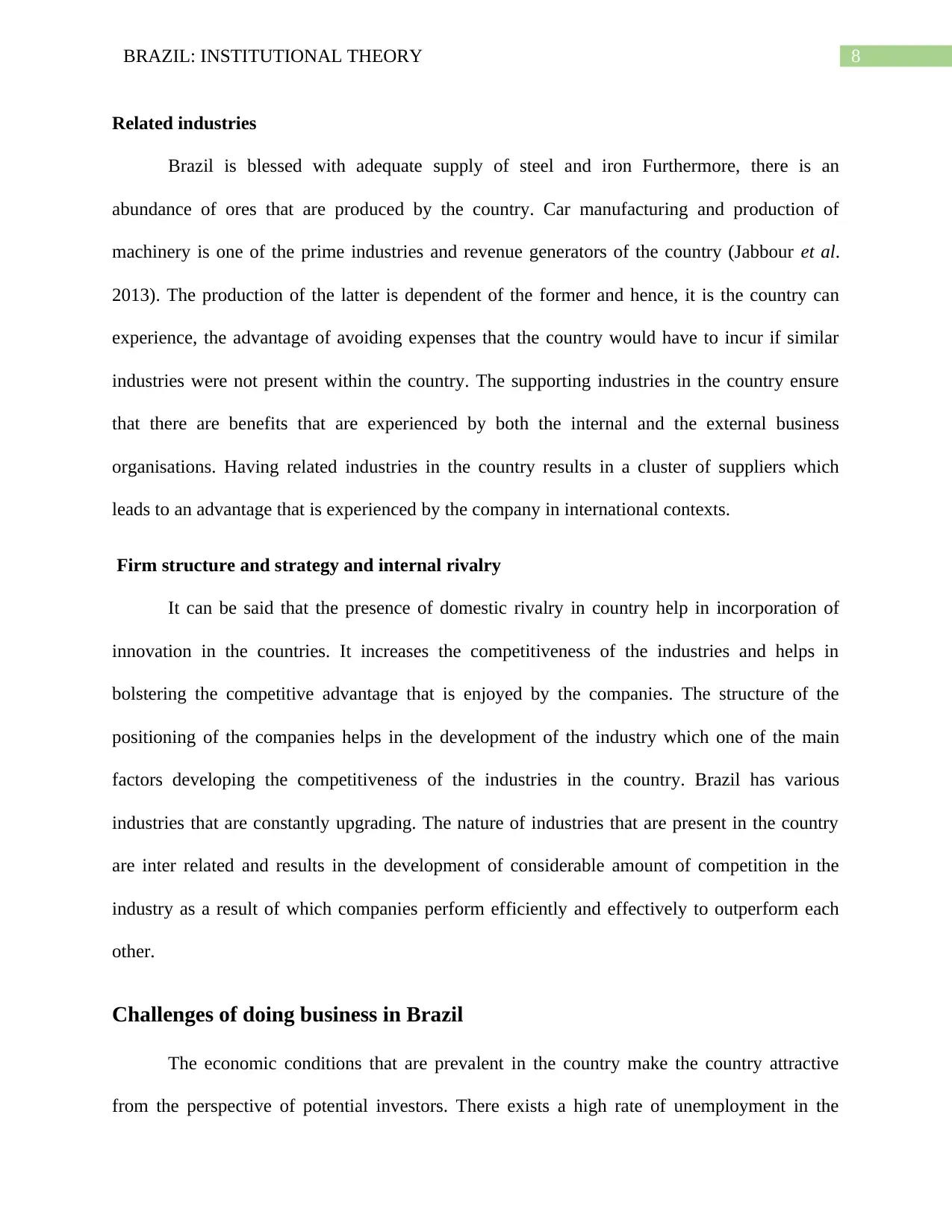
8BRAZIL: INSTITUTIONAL THEORY
Related industries
Brazil is blessed with adequate supply of steel and iron Furthermore, there is an
abundance of ores that are produced by the country. Car manufacturing and production of
machinery is one of the prime industries and revenue generators of the country (Jabbour et al.
2013). The production of the latter is dependent of the former and hence, it is the country can
experience, the advantage of avoiding expenses that the country would have to incur if similar
industries were not present within the country. The supporting industries in the country ensure
that there are benefits that are experienced by both the internal and the external business
organisations. Having related industries in the country results in a cluster of suppliers which
leads to an advantage that is experienced by the company in international contexts.
Firm structure and strategy and internal rivalry
It can be said that the presence of domestic rivalry in country help in incorporation of
innovation in the countries. It increases the competitiveness of the industries and helps in
bolstering the competitive advantage that is enjoyed by the companies. The structure of the
positioning of the companies helps in the development of the industry which one of the main
factors developing the competitiveness of the industries in the country. Brazil has various
industries that are constantly upgrading. The nature of industries that are present in the country
are inter related and results in the development of considerable amount of competition in the
industry as a result of which companies perform efficiently and effectively to outperform each
other.
Challenges of doing business in Brazil
The economic conditions that are prevalent in the country make the country attractive
from the perspective of potential investors. There exists a high rate of unemployment in the
Related industries
Brazil is blessed with adequate supply of steel and iron Furthermore, there is an
abundance of ores that are produced by the country. Car manufacturing and production of
machinery is one of the prime industries and revenue generators of the country (Jabbour et al.
2013). The production of the latter is dependent of the former and hence, it is the country can
experience, the advantage of avoiding expenses that the country would have to incur if similar
industries were not present within the country. The supporting industries in the country ensure
that there are benefits that are experienced by both the internal and the external business
organisations. Having related industries in the country results in a cluster of suppliers which
leads to an advantage that is experienced by the company in international contexts.
Firm structure and strategy and internal rivalry
It can be said that the presence of domestic rivalry in country help in incorporation of
innovation in the countries. It increases the competitiveness of the industries and helps in
bolstering the competitive advantage that is enjoyed by the companies. The structure of the
positioning of the companies helps in the development of the industry which one of the main
factors developing the competitiveness of the industries in the country. Brazil has various
industries that are constantly upgrading. The nature of industries that are present in the country
are inter related and results in the development of considerable amount of competition in the
industry as a result of which companies perform efficiently and effectively to outperform each
other.
Challenges of doing business in Brazil
The economic conditions that are prevalent in the country make the country attractive
from the perspective of potential investors. There exists a high rate of unemployment in the
⊘ This is a preview!⊘
Do you want full access?
Subscribe today to unlock all pages.

Trusted by 1+ million students worldwide
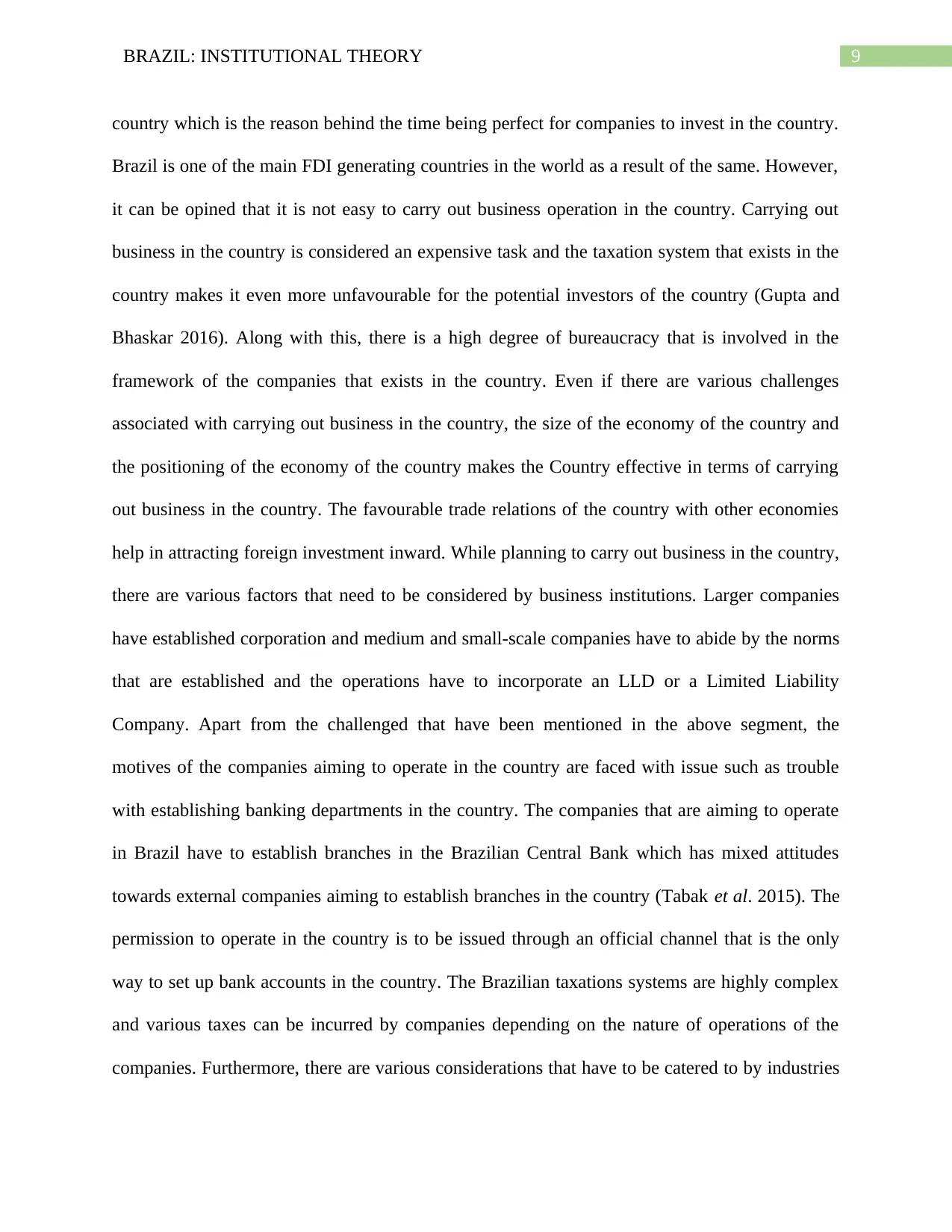
9BRAZIL: INSTITUTIONAL THEORY
country which is the reason behind the time being perfect for companies to invest in the country.
Brazil is one of the main FDI generating countries in the world as a result of the same. However,
it can be opined that it is not easy to carry out business operation in the country. Carrying out
business in the country is considered an expensive task and the taxation system that exists in the
country makes it even more unfavourable for the potential investors of the country (Gupta and
Bhaskar 2016). Along with this, there is a high degree of bureaucracy that is involved in the
framework of the companies that exists in the country. Even if there are various challenges
associated with carrying out business in the country, the size of the economy of the country and
the positioning of the economy of the country makes the Country effective in terms of carrying
out business in the country. The favourable trade relations of the country with other economies
help in attracting foreign investment inward. While planning to carry out business in the country,
there are various factors that need to be considered by business institutions. Larger companies
have established corporation and medium and small-scale companies have to abide by the norms
that are established and the operations have to incorporate an LLD or a Limited Liability
Company. Apart from the challenged that have been mentioned in the above segment, the
motives of the companies aiming to operate in the country are faced with issue such as trouble
with establishing banking departments in the country. The companies that are aiming to operate
in Brazil have to establish branches in the Brazilian Central Bank which has mixed attitudes
towards external companies aiming to establish branches in the country (Tabak et al. 2015). The
permission to operate in the country is to be issued through an official channel that is the only
way to set up bank accounts in the country. The Brazilian taxations systems are highly complex
and various taxes can be incurred by companies depending on the nature of operations of the
companies. Furthermore, there are various considerations that have to be catered to by industries
country which is the reason behind the time being perfect for companies to invest in the country.
Brazil is one of the main FDI generating countries in the world as a result of the same. However,
it can be opined that it is not easy to carry out business operation in the country. Carrying out
business in the country is considered an expensive task and the taxation system that exists in the
country makes it even more unfavourable for the potential investors of the country (Gupta and
Bhaskar 2016). Along with this, there is a high degree of bureaucracy that is involved in the
framework of the companies that exists in the country. Even if there are various challenges
associated with carrying out business in the country, the size of the economy of the country and
the positioning of the economy of the country makes the Country effective in terms of carrying
out business in the country. The favourable trade relations of the country with other economies
help in attracting foreign investment inward. While planning to carry out business in the country,
there are various factors that need to be considered by business institutions. Larger companies
have established corporation and medium and small-scale companies have to abide by the norms
that are established and the operations have to incorporate an LLD or a Limited Liability
Company. Apart from the challenged that have been mentioned in the above segment, the
motives of the companies aiming to operate in the country are faced with issue such as trouble
with establishing banking departments in the country. The companies that are aiming to operate
in Brazil have to establish branches in the Brazilian Central Bank which has mixed attitudes
towards external companies aiming to establish branches in the country (Tabak et al. 2015). The
permission to operate in the country is to be issued through an official channel that is the only
way to set up bank accounts in the country. The Brazilian taxations systems are highly complex
and various taxes can be incurred by companies depending on the nature of operations of the
companies. Furthermore, there are various considerations that have to be catered to by industries
Paraphrase This Document
Need a fresh take? Get an instant paraphrase of this document with our AI Paraphraser
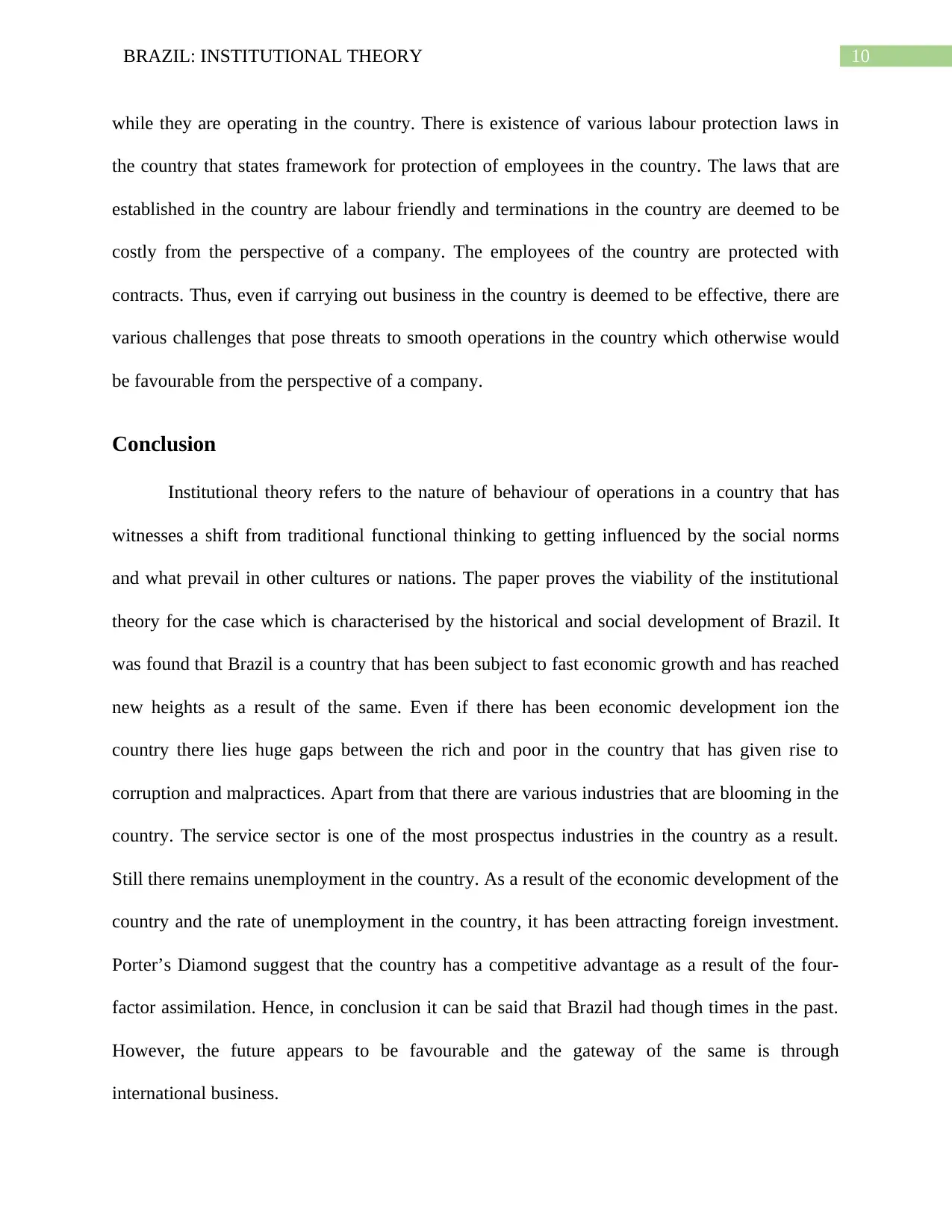
10BRAZIL: INSTITUTIONAL THEORY
while they are operating in the country. There is existence of various labour protection laws in
the country that states framework for protection of employees in the country. The laws that are
established in the country are labour friendly and terminations in the country are deemed to be
costly from the perspective of a company. The employees of the country are protected with
contracts. Thus, even if carrying out business in the country is deemed to be effective, there are
various challenges that pose threats to smooth operations in the country which otherwise would
be favourable from the perspective of a company.
Conclusion
Institutional theory refers to the nature of behaviour of operations in a country that has
witnesses a shift from traditional functional thinking to getting influenced by the social norms
and what prevail in other cultures or nations. The paper proves the viability of the institutional
theory for the case which is characterised by the historical and social development of Brazil. It
was found that Brazil is a country that has been subject to fast economic growth and has reached
new heights as a result of the same. Even if there has been economic development ion the
country there lies huge gaps between the rich and poor in the country that has given rise to
corruption and malpractices. Apart from that there are various industries that are blooming in the
country. The service sector is one of the most prospectus industries in the country as a result.
Still there remains unemployment in the country. As a result of the economic development of the
country and the rate of unemployment in the country, it has been attracting foreign investment.
Porter’s Diamond suggest that the country has a competitive advantage as a result of the four-
factor assimilation. Hence, in conclusion it can be said that Brazil had though times in the past.
However, the future appears to be favourable and the gateway of the same is through
international business.
while they are operating in the country. There is existence of various labour protection laws in
the country that states framework for protection of employees in the country. The laws that are
established in the country are labour friendly and terminations in the country are deemed to be
costly from the perspective of a company. The employees of the country are protected with
contracts. Thus, even if carrying out business in the country is deemed to be effective, there are
various challenges that pose threats to smooth operations in the country which otherwise would
be favourable from the perspective of a company.
Conclusion
Institutional theory refers to the nature of behaviour of operations in a country that has
witnesses a shift from traditional functional thinking to getting influenced by the social norms
and what prevail in other cultures or nations. The paper proves the viability of the institutional
theory for the case which is characterised by the historical and social development of Brazil. It
was found that Brazil is a country that has been subject to fast economic growth and has reached
new heights as a result of the same. Even if there has been economic development ion the
country there lies huge gaps between the rich and poor in the country that has given rise to
corruption and malpractices. Apart from that there are various industries that are blooming in the
country. The service sector is one of the most prospectus industries in the country as a result.
Still there remains unemployment in the country. As a result of the economic development of the
country and the rate of unemployment in the country, it has been attracting foreign investment.
Porter’s Diamond suggest that the country has a competitive advantage as a result of the four-
factor assimilation. Hence, in conclusion it can be said that Brazil had though times in the past.
However, the future appears to be favourable and the gateway of the same is through
international business.
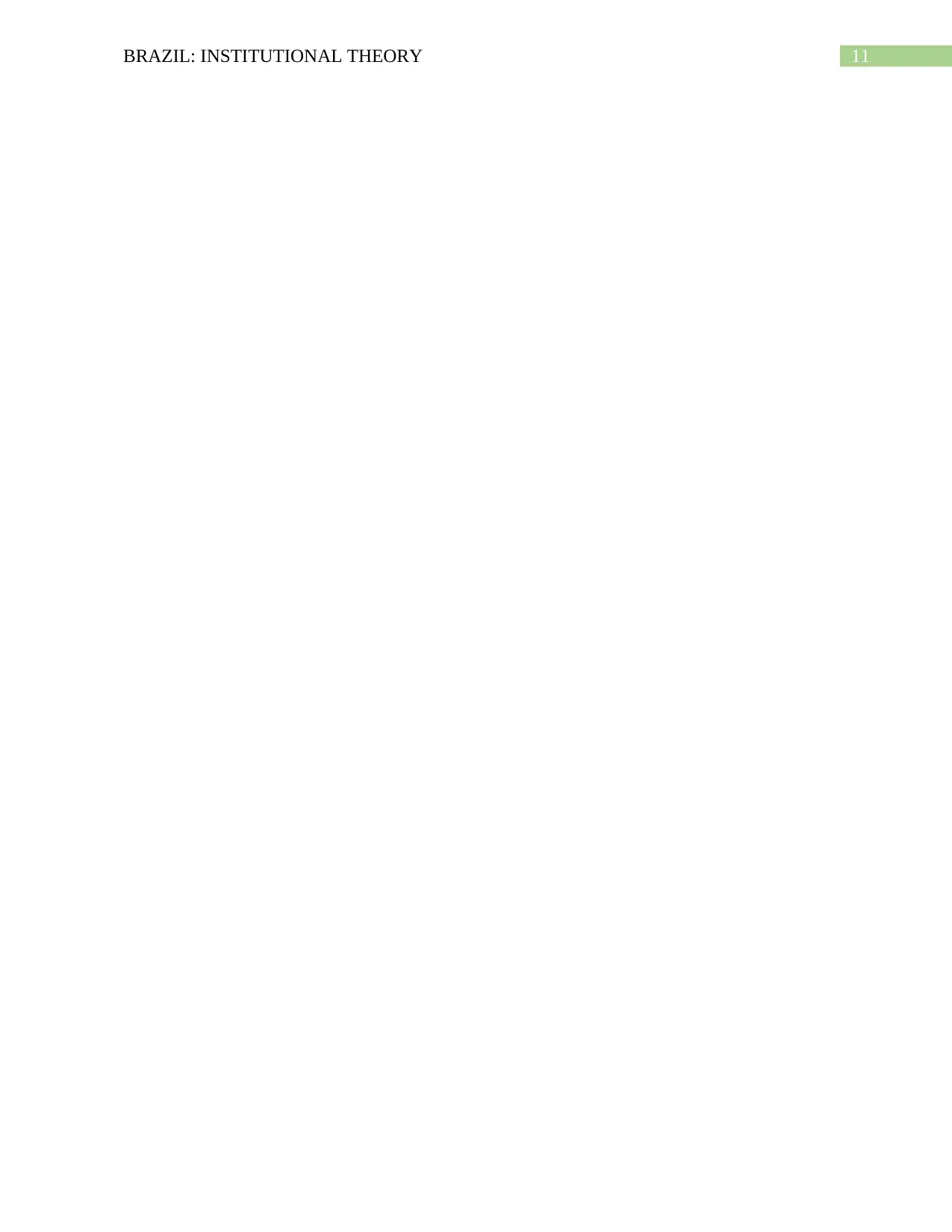
11BRAZIL: INSTITUTIONAL THEORY
⊘ This is a preview!⊘
Do you want full access?
Subscribe today to unlock all pages.

Trusted by 1+ million students worldwide
1 out of 15
Related Documents
Your All-in-One AI-Powered Toolkit for Academic Success.
+13062052269
info@desklib.com
Available 24*7 on WhatsApp / Email
![[object Object]](/_next/static/media/star-bottom.7253800d.svg)
Unlock your academic potential
Copyright © 2020–2026 A2Z Services. All Rights Reserved. Developed and managed by ZUCOL.





